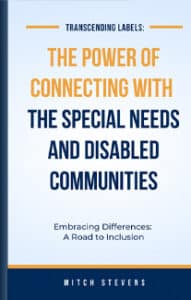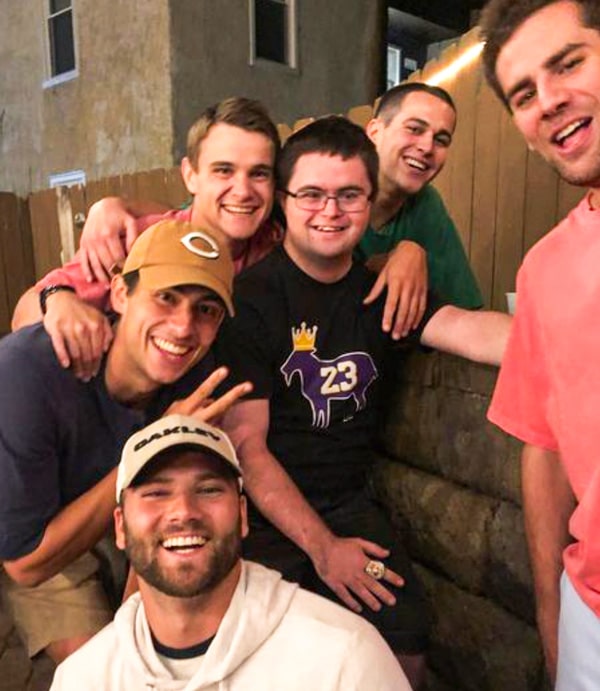A couple of weeks ago, I wrote a short blog asking for feedback on the idea of getting concepts from Transcending Labels into schools around the country; I’d like to expand on that vision.
A dream scenario for this vision would include having students read the book, participate in a series of lesson plans around some of the key concepts, hear a message from a guest lecturer one day (that would be me :)), volunteer their time for course credit, give a short presentation on what they’ve learned and how they will apply it in their lives, etc. That is the dream scenario, though.
I have no illusions about our school systems or the immense pressures that are put on our teachers as it relates to curriculum. I understand that I won’t simply waltz into a middle school, have one conversation and BOOM! A four-week lesson plan is now in the curriculum. Not gonna happen.
That does not mean, however, that something cannot happen relatively quickly, and I’d be doing myself a disservice to think that way. I’ve written at length about this mission spreading “one at a time;” one conversation, one book sale, one new Amazon review, one young student being inspired— one. at. a. time. This vision involving our education system is no different. If I could get the buy-in from one person at one school for one part of this thing, that is certainly a win.
My first blog about the idea was a high-level overview, so let’s unpack more of why I feel called to pursue this mission. So much of how we view the world as adults is shaped during our childhood and early adolescence. My experience in high school with the special needs and disabled communities has made a drastically positive impact on who I am as person. With that being said, I’d like that same experience to show up for other young people across our country. In addition to this, my experience learning and working in the arena of personal growth qualifies me to speak on topics related to that, too. I’d love to combine these strengths to help schools develop stronger, mentally-tougher, emotionally intelligent young people, even if they are only hearing from me once a year at first.
Of course, I want our future society to be collectively more compassionate for individuals with special needs. I want them to be acutely aware of the incredible strengths and capabilities of these individuals, but it doesn’t stop there. I feel there is a significant need for helping our young people develop habits that facilitate mental toughness and a growth mindset as well. I feel there is a need to get back to saying “it is okay and even admirable to play to win at what you do!” To be clear, when I say “play to win,” I’m talking about in everything we do, this is not a sports message. I was once taught this concept around the ‘happiness gap,’ which essentially said that our happiness, or lack thereof, is often dictated by whether or not our expectations meet our reality. This is precisely the issue with completely going overboard and teaching kids that you should get a trophy for finishing in last place. In just about everything in life, there are winners and losers. It is straightforward, black and white, and teaching the opposite sets our future generations up for a life of depression as their expectations consistently do not match up with reality. By the way, “there are winners and losers in everything” can sound a little harsh, I know. However, how many of you reading this have heard about super successful and/or fulfilled individuals talking about how perceived ‘failures’ led to their success? How they wouldn’t be where they are today without several key losses? Every one of my favorite inspirational movies, books, or real-life stories contain some element of dealing with and overcoming failure. That is the important distinction to remember. Losing at something does not consign you to being a loser for life; it actually teaches you some of the best lessons the world has to offer! To that end, it is not noble or admirable to shrink yourself down or play to less than your full abilities to make others feel like they’re winning, too. That is not how life works, and it is no different when it comes to individuals with special needs. Yes, we want to include them and make them feel loved, seen, and appreciated— everybody deserves that. That does not, however, mean that we lower our standards of anyone around us, especially those with special needs. It doesn’t make others better and as it relates to the special needs community, it actually hurts them. It lowers their dignity and sense of self-worth when we do this, even if our heart is in the right place.
When I spoke with Steve and Colleen Hunt for Transcending Labels, a recurring theme came up for them that speaks to this concept. ICYMI: their son, Robert, is a great friend of mine and was born with Down Syndrome.
“Treat him just as you would any other person.”
 When he first went to high school, a family friend of theirs was coaching basketball at the school and Robert was joining the team as a student manager.
When he first went to high school, a family friend of theirs was coaching basketball at the school and Robert was joining the team as a student manager.
“Treat him like your little brother, don’t be soft on him. Just like anybody else on the team.”
In a recent phone conversation, we talked about the fact the Robert has been in his role with Huntington Bank for nearly seven years. How many of you reading this have held the same job that long? I kid 🙂
But seriously, that is impressive. If you’re reading this, good for you, Rob! I bring this up because in that conversation with Steve, he spoke about the people with whom Rob works. He has a great deal of respect for the leadership at Huntington, and he echoed the same concept as it relates to Rob getting started with them back in 2017:
“Treat him just like you would any other employee. Don’t be soft on him, and don’t let him get away with things that his colleagues would not.”
This is something that cuts to the heart of my mission with Transcending Labels. I cannot speak for all parents or loved ones of an individual with special needs, but I’d be surprised to find many of them with a different mindset. The concept above is centered not around equality, but equity.
Are there certain roles at the bank that would not make sense for Robert? Of course. He has unique strengths and weaknesses, just like you and I. Too often I feel that our society views inclusion as giving every single person the exact same opportunities, regardless of any other factors. That, in my opinion, is irresponsible and actually counterproductive.
Inclusion and equity says that in all areas of life, I will meet people where they are. I will work to lessen my judgment of others, whether that person is deemed “typically-functioning,” or if they born with special needs and/or disabilities. As a middle or high school student, I will not lower my expectations of someone in my class because they have special needs and/or disabilities. My default approach to these individuals will not be to avoid them, because I will have been taught how to interact in those situations. I will not default to “babying” these individuals because their strengths are different than mine. I have weaknesses just as they do; theirs just may be more readily apparent to me.
The above statements encapsulate much of my mindset regarding the special needs community. I feel extremely grateful to have learned and developed this mentality over the past 15 years. However, I also recognize that a big reason why I have been blessed to learn these things comes down to luck and happenstance.
If my high school basketball teammate never encouraged me to attend that first after school club, where was I going to learn these things? How much better could our society be as whole if we were intentional about teaching it from an early age? These are questions that drive my passion for making this vision come to fruition.
Again, it doesn’t have to be this several-week lesson plan; at least not to start, anyway 🙂 What could be the outcome if one school administrator in one district allowed me to speak one time to one group of students?
Is it possible that one of the students in class that day is inspired by the message? Is it possible that the same student could decide to volunteer at the after school club or a “Best Buddies” walk one time? And from there, is it possible that one experience could lead that individual down a path of becoming a better person in several areas of their life due to that exposure? Speaking from direct experience here, folks, it is absolutely is.
So, if you want to tell me that this dream vision is not possible due to a number of obstacles involved in our education system, I respect that. I’d even say that on a number of points, I’d probably agree with you. However, nothing is stopping this train. The mission is too important.

